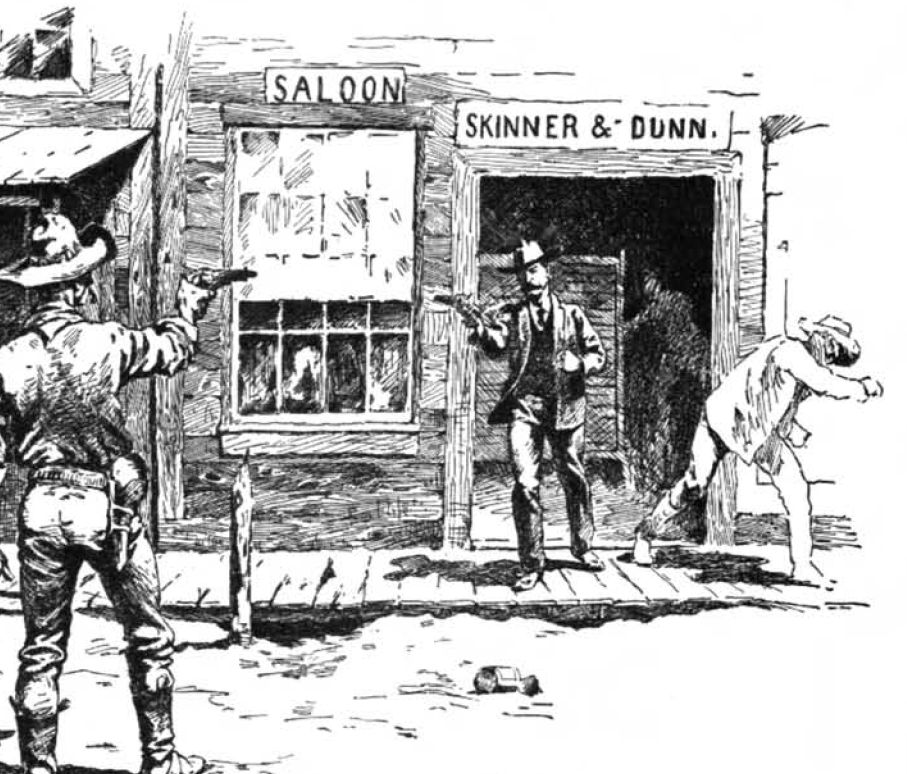Skinner & Dunn Saloon

Nestled along the dusty main street of Cactus Flats, a rugged, sun-baked desert town, the Skinner & Dunn Saloon stands as a weathered testament to the rough and tumble life of the frontier. The saloon’s name, painted in large, faded letters on a wooden sign above the swinging double doors, which creak with every gust of wind.
The building itself is a two-story structure made from weathered cedar planks, their once-bright wood now bleached by years of relentless sun. The front is scattered with dirt and patches of cracked earth, and the ground beneath is hard-packed and sunbaked, with the occasional tumbleweed rolling past.
Above the saloon doors, a hand-painted sign reads “Skinner & Dunn Saloon” in bold, somewhat slanted lettering, with the “Skinner” half of the name being slightly more worn. The letters are still distinguishable, though time has softened their edges.
Once inside, the saloon reveals a dim, smoky atmosphere, with the clinking of glasses and the low hum of conversation. The wooden floors creak underfoot, worn down by the steady stream of boots over the years. A long bar runs along the far wall, made from rough-hewn timber and polished with years of use. Behind the bar, a mirror, slightly cracked, reflects the dim light from oil lamps hanging from the ceiling, casting warm, golden hues over the room. The bar is stocked with whiskey, gin, and local brews, and there’s always a bottle of something strong for those who prefer it straight.
A pair of saloon girls in simple but colorful dresses stand by a table in the corner, offering a bit of lively company to the patrons, while a piano plays softly in the background. The small stage at the far end of the room is often used by traveling musicians, though most of the entertainment in this town happens after sundown.
The saloon is a gathering place for everyone in Cactus Flats, from cowhands fresh off the trail to local ranchers trying to beat the heat. It’s here that deals are made, news is traded, and, on occasion, trouble brews.
At the back of the saloon, a stairway leads up to a narrow hall where rooms can be rented, and above, the second story provides a view of the desert horizon. There are stories that a hidden room or passageway exists somewhere inside, but those are just whispers.
Hank “Skinner” Calloway and Tom “Dunn” Davenport are the two men who founded the Skinner & Dunn Saloon, and their partnership is as legendary as the saloon itself.
Hank “Skinner” Calloway:
Hank Calloway, known as “Skinner” to most, was a rugged cowboy with a sharp mind for business. Born in Missouri and raised on the fringes of the law, Hank worked as a cattle rustler, bounty hunter, and a scout for a Union cavalry unit during the Civil War. His nickname, “Skinner,” came from his early days working with animals and his habit of skinning the toughest of critters with expert precision—whether they were wild animals or “bad hombres.”
After the war, Skinner wandered the western frontier, drifting through various towns and jobs. He was known for his quick wit, faster draw, and his ability to strike a deal when no one else could. His rough exterior hid a man who understood how to navigate the chaotic life of the frontier.
When he arrived in Cactus Flats, he saw the potential for a thriving town centered around the ever-growing cattle trade. But it wasn’t until he met Tom Dunn that he saw the opportunity for a more stable future in the bar and hospitality business. Skinner’s sharp mind for deals and the law made him a perfect match for Dunn.
Tom Davenport, known as “Dunn,” was an entirely different sort of man. A former bartender turned entrepreneur, Dunn was a smooth talker with a natural flair for managing people and a keen understanding of what the frontier population wanted in a drink. Dunn came from a well-to-do family back east, but after a series of bad investments, he found himself broke and out of options. When he found his way to Cactus Flats, he was looking for a fresh start, though he carried a few scars from his past—both emotional and financial.
Dunn quickly gained a reputation as a man with excellent taste in whiskey, a love for good cigars, and a talent for keeping the peace in any establishment he ran. Though he lacked the rough edge of a cowboy like Skinner, Dunn’s sharp social skills and smooth demeanor made him well-liked by everyone who frequented his saloons, and they soon developed a loyal following.